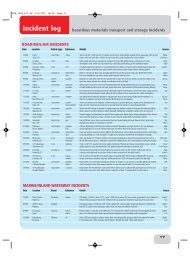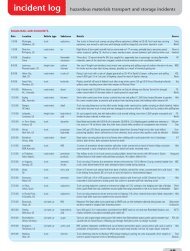On time... - Lloyd's List
On time... - Lloyd's List
On time... - Lloyd's List
Create successful ePaper yourself
Turn your PDF publications into a flip-book with our unique Google optimized e-Paper software.
introduction<br />
Every generation looks to the last for direction and lessons<br />
learned. Our latest batch of industry leaders has more than<br />
enough to chew on as it deliberates what went wrong and<br />
forges its own path ahead.<br />
It is difficult to characterise generational traits amid a diverse<br />
array of individuals and companies that we have picked for<br />
this report, but it seem fair to conclude that our crop of young<br />
leaders has become more sophisticated than its predecessors.<br />
They appear more risk aware, although it should be noted<br />
that is very different from being risk averse. This generation<br />
has seen the extremes that a shipping cycle has to offer and<br />
risk management is high on the agenda, even as it searches<br />
for the opportunities that history tells it must be waiting at the<br />
bottom.<br />
They are more concerned with corporate governance and<br />
are certainly more transparent than the last generation who<br />
gave up information as if it were their market share.<br />
Many in our list cite the need to focus on low leverage, strong<br />
cash flows and the ability to survive downturns. Ironically it<br />
is the impatient young upstarts that are taking that long-term<br />
outlook.<br />
While the fundamentals of shipping remain, our next<br />
generation will lead an entirely different market that is driven<br />
by new political realities and a rapidly changing global<br />
economic and regulatory agenda.<br />
Perhaps even more significantly they enter an industry on<br />
the cusp of a technical generational shift driven by fuel costs<br />
6 next generation 2012<br />
“the next generation<br />
is often left waiting<br />
for the previous<br />
generation to<br />
loosen its grip a<br />
little. retirement is<br />
apparently something<br />
that happens in other<br />
industries, but not in<br />
shipping”<br />
and the need to rethink much of the global supply chain in<br />
search of efficiencies.<br />
But for all their attempts to differentiate themselves from the<br />
previous generation, many of those we have spoken to cite the<br />
old values of hard work, integrity and loyalty as the guiding<br />
principles for any modern business.<br />
In a highly cyclical industry, it pays to have a tangible<br />
reminder of what has worked and what has not. Family<br />
businesses tend to have long memories, a fact that can be an<br />
advantage just as it can weigh heavily on those who inherit it.<br />
There is something special about shipping that only insiders<br />
can understand. People have a genuine passion for it that you<br />
do not tend to see in quite the same way elsewhere. For the<br />
shipping dynasties, that feeling is intensified.<br />
While the weight of expectation can be unreasonably<br />
high for some, the power that a family business wields can<br />
be highly advantageous. When successfully pulling in the<br />
same direction, families are more nimble in their decisionmaking<br />
than companies that have to convince shareholders<br />
and boards. They can also make long-term decisions without<br />
concern for quarterly dividends, bound in the knowledge that<br />
eventually they will come out ahead.<br />
But for all their advantages, the continued success of the<br />
shipping dynasties is by no means guaranteed. While success<br />
can often breed success, business skills are not genetic. Sound<br />
succession planning is as much about finding the right talent<br />
in family businesses as it is anywhere else.




